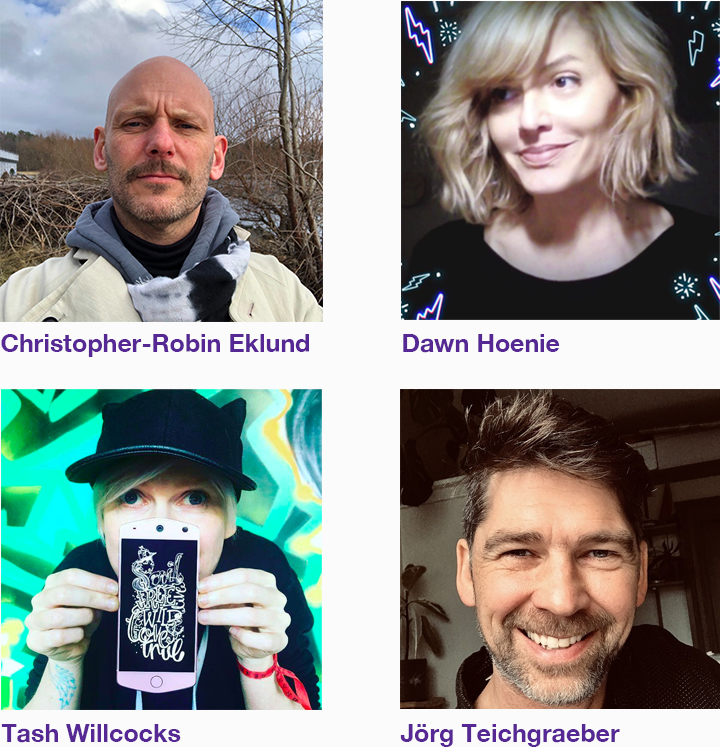AT HYPER ISLAND, OUR WAY OF DELIVERING VALUE IS BASED ON OUR APPROACH OF LEARNING BY DOING. WE DON’T EMPLOY TEACHERS HERE, ONLY INDUSTRY LEADERS AND WE BELIEVE IN THE POWER OF FACILITATION. HERE, TOOLS ARE INTRODUCED AS A PROCESS AND THERE ARE RARELY RIGHT OR WRONG ANSWERS. WE FOCUS ON STRATEGIC FACILITATION FOR BETTER MEETINGS AND WORKSHOPS AND FOR US, SUCCESSFUL FACILITATION MEANS THAT DISCUSSIONS ARE LED BY PARTICIPANTS THROUGH COLLABORATION.
We spoke to our facilitation experts, Christopher-Robin Eklund (Programs Director) Tash Willcocks (Director of Master’s Europe), Jörg Teichgraeber (Program Director, Karlskrona) and Dawn Hoenie (Chief Methodologist) to get a better insight into successful facilitation in the workplace.

How would you characterize a successful facilitator?
CRE: An individual who has learnt that behaviors are results of needs (and every human has needs). So whatever happens, understand the needs above all else. The successful facilitator understands their role to be nothing but a lever to enable the group to move forward. They not only understand their own needs but also know how to manage the needs of others continuously in the process. They should be always ready in the moment; ready to change the process to enable the group to move toward the desired outcome.
DH: A facilitator is a process guide; someone who makes a process easier by creating frameworks and methods and guides a group to achieve their purpose. A key responsibility as a facilitator is to create group processes that flow and an environment of safety and trust to enable people and processes to thrive. They also support the group to reach a successful conclusion, and then a plan for implementation.
JT: When we tried to collaboratively construct a narrative around facilitation, we discovered that there is a wide range of different perspectives on facilitation at Hyper Island. For me, facilitation is a leadership style. It’s the art of helping a group to develop and make decisions based on consensus. The only way to become a facilitator is to prepare, practise, evaluate and reflect and then a to practice this again and again.
>Facilitation is essential to successful teams and group work. It’s also a key skill for people to have to ensure organizational success, especially given the presence of change. Constant change is a natural part of working in an organization.
Tash Willcocks
How do you approach your preparation as a facilitator?
CRE: As a facilitator I have to know what the purpose or desired outcome of the session is and then design for this. Also, I need to be mentally ready to make changes in the actual delivery. So, no matter the design, it should always have room for re-design in the moment. I also create a schedule with a timeframe and a desired outcome for each part of the design. I practise out loud—by actually performing the session without participants and ensure that I am ready for any surprises or parts that I can’t plan for. As an example, how do I include a late participant? Or a participant who does not follow the process?
TW: Walk in prepared, but not over prepared. Never presume you know what is going to happen or how someone is feeling. Humans are amazing but complicated creatures—if you have a rigid plan, not going to be very successful!
Why is facilitating so important in 2020?
CRE: It’s important to remember that the facilitator is not typically responsible for providing answers. However, the facilitator is responsible for helping the group find insights by using questions such as: ’What do you think?’
DH: Facilitation is essential to successful team and group work. It’s also a key skill for people to have to ensure organizational success, especially given the presence of change. Constant change is a natural part of working in an organization.
While change may at first seem menacing and may not feel comfortable, it can be positive and necessary. Facilitation can enable powerful change, maximize participant engagement, and encourage meaningful and respectful conversations.
Every meeting or process that is facilitated has an impact on the individuals and the groups of which they are a part. Good facilitation can change the way people think and behave, and ultimately support them to positively create change around them.
What learning solutions or tools does Hyper Island offer to develop facilitation skills?
CRE: We have our Process Design and Facilitation Course. Here, students learn how to use facilitation as a tool to boost innovation and to solve complex issues. By the end of the course, students have the ability to engage and include participants when running workshops, ideation, and prototyping processes, as well as to build supportive environments and set up guidelines for groups.
DH: At Hyper Island, we have created a resource for anyone who wants to do things more creatively and collaboratively in their team or organization. It’s a collection of methods and activities based on Hyper Island’s methodology that you can start using today.
Here are some tools to consider using in your facilitated sessions to help ensure success:
- Define purpose and structure of the project
- Energizers
- Setting an agenda
- Voting
- Checking in and checking out
- Check in and check out questions
- Parking lot
- Client centricity innovation
What will facilitating look like in the future?
CRE: I believe facilitating will be less of a mystery and more of a lifestyle. The facilitator’s mindset is something that once you practise and understand it, it will change the way you approach everyday situations.
DH: It’s here! Facilitation requires a digital-first mindset, making digital collaboration a cornerstone and not an add-on. The facilitation experiences that we are now creating are often blended (face to face and online), and we are creating fully online facilitated experiences too. Facilitation is weaved with the technology that is available around us. There are a host of digital tools and a few examples of what we might currently use include: bots (to support learning experiences), Slack or MS teams (to engage with online participants asynchronously, support peer-to-peer learning, create a learning community), Asana and Trello (to manage tasks and stay organized), Mural (visual collaboration tool), Google Drive (to share content), and Zoom (to communicate in real time with participants, where we can create breakout rooms)—there are many other digital tools out there! Facilitators need to make it easy for people to work and learn, sometimes without being in the same room or the same time zone. We need to keep the momentum going wherever people are.
TW: The future of facilitation will start involving more blended options, if not totally remote. Climate change calls for less travel, the threat of pandemics less face to face, and though this sounds dystopian, tech opens up huge opportunities to not see this as a barrier but an opportunity. Facilitators will need a whole host of new skills to understand human interactions through the screen and run workshops in online spaces rather than physical. Navigating these spaces is an exciting new prospect.
What is the essence of facilitation at Hyper Island?
Hyper Island has over two decades of facilitation experience. We are confident in our ability to equip our students and clients with the tools and methods needed to manage human behavior—all while providing the opportunity to practice the newly learned skills on site. We’ve seen an increase in the demand for facilitation skills and knowledge. That’s why we want to share all our best practices from the past 20 years of working with facilitation.
Find out more about how we incorporate facilitation into our approach or access the course plan for our Process Design and Facilitation course.


